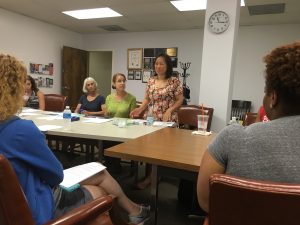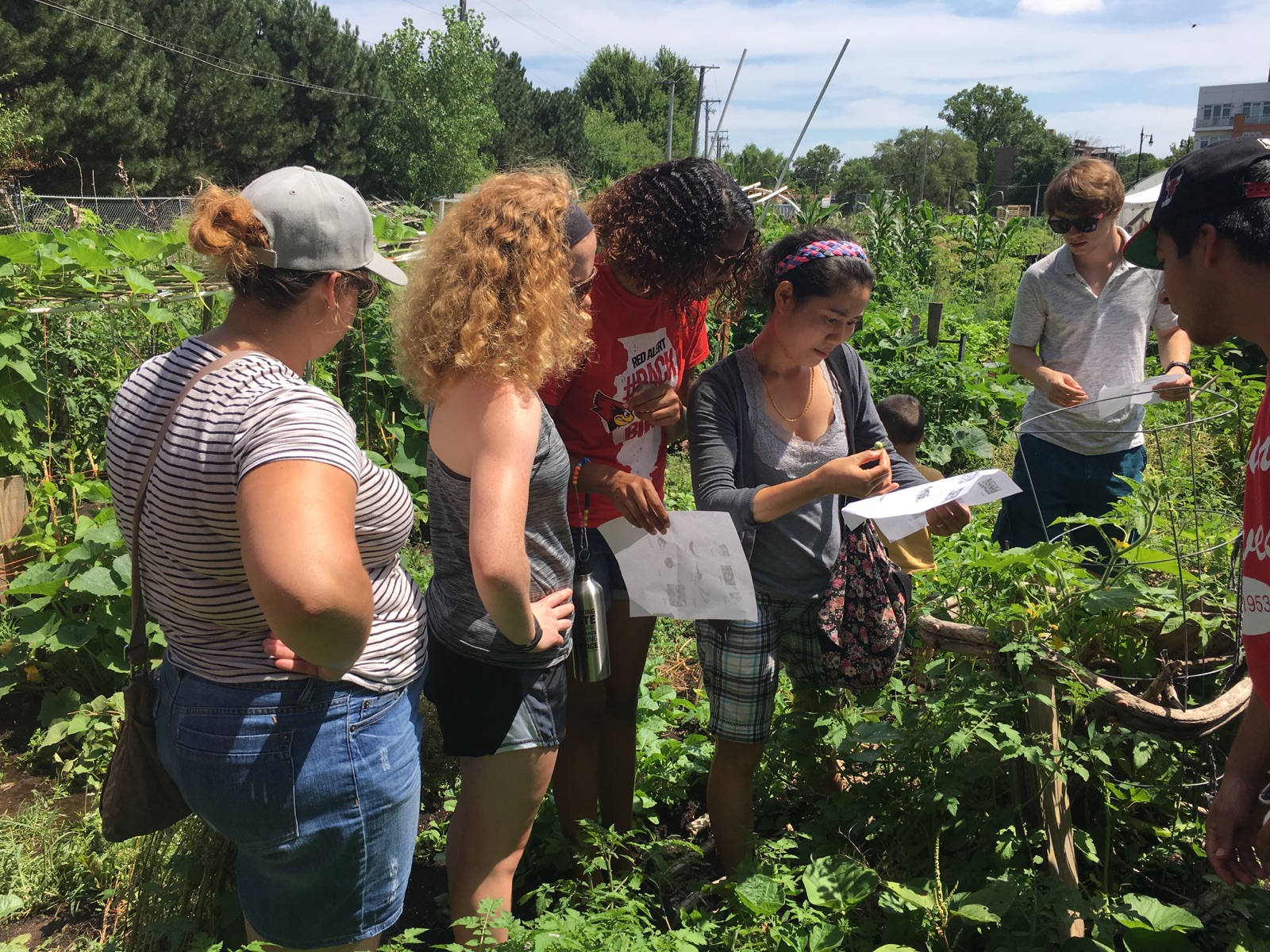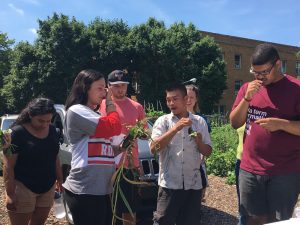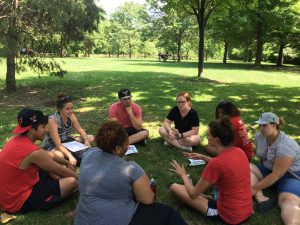We are living in a time of immense migration, where 1 out of 122 people have been forced to flee their homes, and there are 60 million refugees worldwide. We are all impacted by these patterns of human flight in our increasingly globalized world, and more and more future generations will be as well.
Teachers not only need to understand their refugee and migrant students’ and families’ unique needs, but they must also breathe a sense of empathy, inclusion, and community into their classrooms to ensure all students feel welcome, supported, and that their unique cultural assets are highlighted. Teaching the necessary values and skills to cross-culturally communicate and collaborate is crucial at this moment in history.
Illinois State University’s STEP-UP fellows gathered July 22 at the North River Commission’s (NRC) office and Global Gardens Refugee Training Farm to participate in a service-learning event focused on refugee resettlement and the refugee student experience.
NRC’s office and Global Gardens are located in the neighborhood of Albany Park, which serves as a port of entry for Chicago’s immigrant and refugee groups from Asia, Central and South America, the Middle East, Africa, and Europe. Residents speak over 40 languages and 150 different dialects. Consequently, global issues and conflicts are felt locally. The Burmese and Bhutanese have been ravaged by ethnic cleansing and civil wars in their home countries, and those that have found their way to Chicago have learned to cope with this trauma as they assimilate into a new society in distinct ways.
Choosing Global Gardens
One method Albany Park refugees have used to cope and lay roots in their new home is through growing and cultivating foods they farmed in their native lands at Global Gardens. Planning for the ISU service-learning event, the farm was the central focus, as it encapsulated the many issues (e.g., access to resources, food equity, trauma and violence, safe spaces, and a sense of belonging) that affect not only these refugee populations, but other marginalized communities.

Yvette Kyaw shares her experience of fleeing her home country, living in a refugee camp, and resettling in Chicago.
But first the Illinois State fellows were given context presented by refugee social service staffers to frame their experience with the farmers. Our team of presenters included:
- Linda Seyler, farm manager at Global Gardens
- Trudi Lagendorf, youth education coordinator at RefugeeOne
- Yvette Kyaw, health promoter at Heartland Alliance
To begin, each presented and explained their work with refugees and respective organizations, as well as their personal connection to the issue.
Kyaw, a Burmese refugee, eloquently shared her experience of fleeing her home country, living within the confines of a refugee camp, and eventual resettlement in Chicago. The Illinois State fellows were highly engaged and asked informed, pointed questions about all aspects of the refugee experience.
“Being educated about what’s happening politically in students’ home countries isn’t something I’ve considered before,” one fellow said. “But obviously these events can have a big effect on a child’s parents and home life. Knowing about them as a teacher is important.”
Reverse language lesson
To really give the fellows perspective and provide them with a glimpse through the eyes of their future refugee students and parents, presenters conducted a reverse language lesson in Burmese. Fellows were asked to pretend they had just arrived as American refugees in their new country of Burma, and were now tasked with learning to read and write in a language they had never been exposed to before.
Speaking solely in Burmese, Kyaw led the group through introductions, a recitation of the alphabet, and instructions for a vegetable identification activity to be completed at the farm later in the day. The fellows gave a valiant effort, but many stumbled, giggled, and had great difficulty pronouncing the Burmese words and sounds. Eventually we had to give the instructions for the vegetable identification activity in English.
“The Burmese language lesson was really difficult and frustrating,” one fellow said. “The experience definitely makes me better empathize with my English language learning students.”
When fellows arrived at the farm in the sweltering mid-summer heat, they were greeted by smiling Burmese farmers ready to lead them around the farm, to locate vegetables native to their home country, and to name them in their native language. The sweaty Illinois State students followed their guide, and listened intently to their refugee ambassadors as they toured the garden beds picking choice produce.
Speaking to the concepts of overcoming trauma and cultivating a sense of belonging, a fellow stated, “The Garden is clearly a safe space for the refugees, which was reflected in their demeanor; how confident they were in teaching us the names of vegetables in Burmese. This is a place where they know what to do, and how to do it.”
Students concluded the day in small reflection groups in the shade of trees at nearby Ronan Park. It was at this point when fellows were asked to dig deep, and question what the day had taught them. They were also challenged to draw connections between the service event and their classroom experiences.
“Working today in the garden in the sweltering sun made me recognize my privilege as an educated American,” one fellow said. “People in third world countries, as well as migrant farm workers in this country, endure these conditions everyday to survive.”



